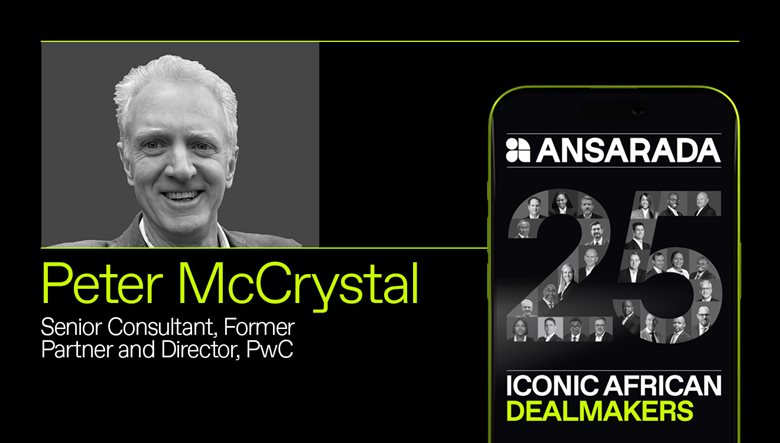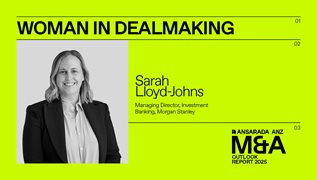Peter McCrystal on navigating cultural nuances and driving win-win solutions in M&A
Peter McCrystal, former partner and director at PwC, and now a consultant, has enjoyed a career spanning several decades in due diligence. He has been at the forefront of transformative deals in the region, significantly shaping South Africa’s corporate landscape.
By AnsaradaMon Aug 11 2025Mergers and acquisitions, Due diligence and dealmaking, Advisors

With over 25 years of M&A experience spanning diverse industries from mining to banking, Peter has been instrumental in shaping South Africa's dealmaking landscape, from early BEE transactions to landmark deals like SAB's London listing that paved the way for their global expansion.
What inspired you to pursue a career in corporate finance, and what has kept you motivated in the M&A industry over the years?
My role in the M&A industry has largely focused on deal strategy, transaction structuring, and pricing through the due diligence process, rather than the lead advisory side of corporate finance. I started my career as a group financial manager at Datakor Limited, a company that later delisted. My role evolved into unbundling the group and disposing of various subsidiaries. This was driven by Unisys’ intention to re-enter South Africa after the country’s transition to democracy and reclaim Unidata, the core of Datakor.Realizing I was essentially working myself out of a job, I approached PwC and asked if they would take me on. That’s how I entered the M&A industry—not by design but through circumstance. What’s kept me engaged for so long is the variety of the work. Every day is different, involving diverse industries from mining to banking. I also value the insights I’ve gained from brilliant executives and entrepreneurs and the energy of young, ambitious colleagues.
Can you share a pivotal moment or mentor who shaped your approach to due diligence in dealmaking?
One of my early influences was Peter Goldhawk. He had a creative approach to transactions but was also incredibly thorough. He taught me that attention to detail is critical and that finding solutions to the challenges within a deal process is paramount. One of the most important lessons I’ve learned in M&A is understanding what truly drives the business being bought or sold.What core values have guided you in navigating the complex environment of dealmaking?
Three principles stand out for me: Integrity – Approach every transaction with honesty and transparency. Win-win solutions – Structure deals so that both parties benefit. Attention to detail – Ensure precision in every aspect of the deal. Can you share a particularly challenging deal and the lessons it taught you?One challenging deal involved a South African bank acquiring a Nigerian bank. After what I thought was a productive meeting, the Nigerian CEO stood up and mentioned finding the discussions acrimonious. It was a wake-up call about the importance of understanding cultural nuances in negotiations. That experience taught me that local negotiation styles and cultural differences are just as important as f inancial and legal due diligence.
What has been a defining deal in your career?
Early on, my role at Datakor was defining, as I was thrown into the deep end of M&A, learning the Companies Act, JSE listing requirements, and transaction structuring. Another pivotal moment was working with SAB on their London listing. Assisting them with UK regulatory compliance and crafting their equity story for investors was a career highlight. That deal paved the way for their global expansion and eventual merger with AB InBev.How has M&A shaped South Africa’s socio‑economic landscape?
BEE transactions have had a profound impact, enabling broader ownership and creating direct benefits for employees through structures like ESOPs. Private equity has also injected growth capital into businesses, improving corporate governance and driving innovation. One memorable deal was Capitalworks’ acquisition of Robertson and Caine, a globally recognized yacht manufacturer and significant employer in South Africa. It showcased the potential of private equity to drive economic impact.What trends have shaped South Africa’s M&A landscape over the past 25 years?
Increasing deal complexity is a standout trend. Many corporates and private equity firms have re-evaluated their strategies, adding layers of sophistication to transactions.What challenges do dealmakers face in South Africa and across Africa?
Aligning price expectations is a key challenge, often influenced by the quality of market and business information.Regulatory complexities, especially in cross-border transactions, also add significant hurdles. How has technology transformed due diligence?
Platforms like Ansarada’s virtual data rooms have streamlined information sharing, making processes more efficient. However, they limit early interaction with management, which remains crucial for successful deals. Big data analytics has also deepened our understanding of business drivers, revolutionizing how transactions are assessed.What do you foresee for South Africa’s M&A space over the next decade?
I’m optimistic. The government seems to be fostering a more investor-friendly economic environment. I anticipate growth in infrastructure, consumer retail, and minerals sectors in the short to medium term.Finally, what advice would you give to aspiring dealmakers?
Patience, flexibility, and resilience are essential. M&A is a rollercoaster—deals often fall through despite significant effort. Staying passionate and managing the highs and lows is key to long-term success.


